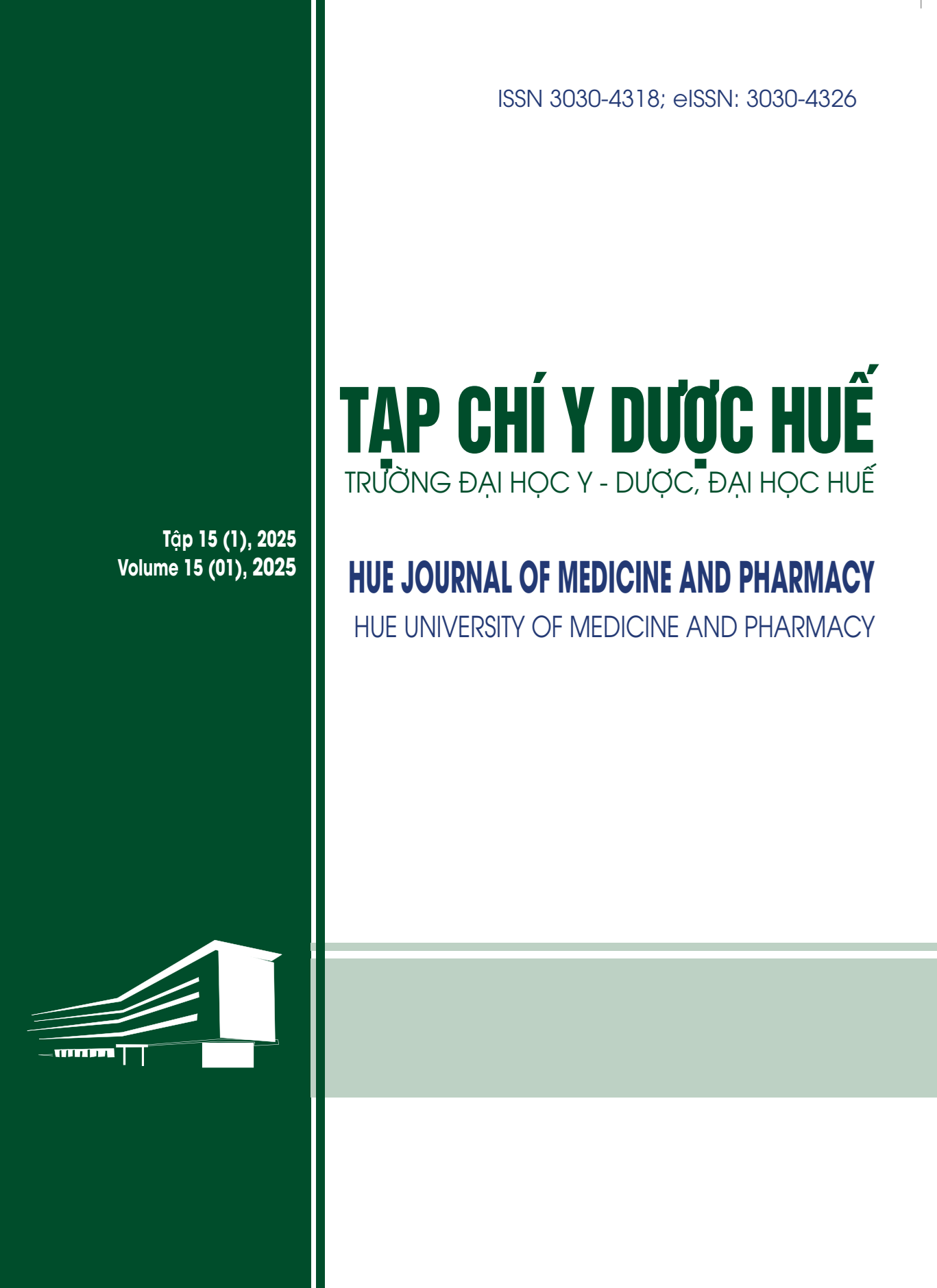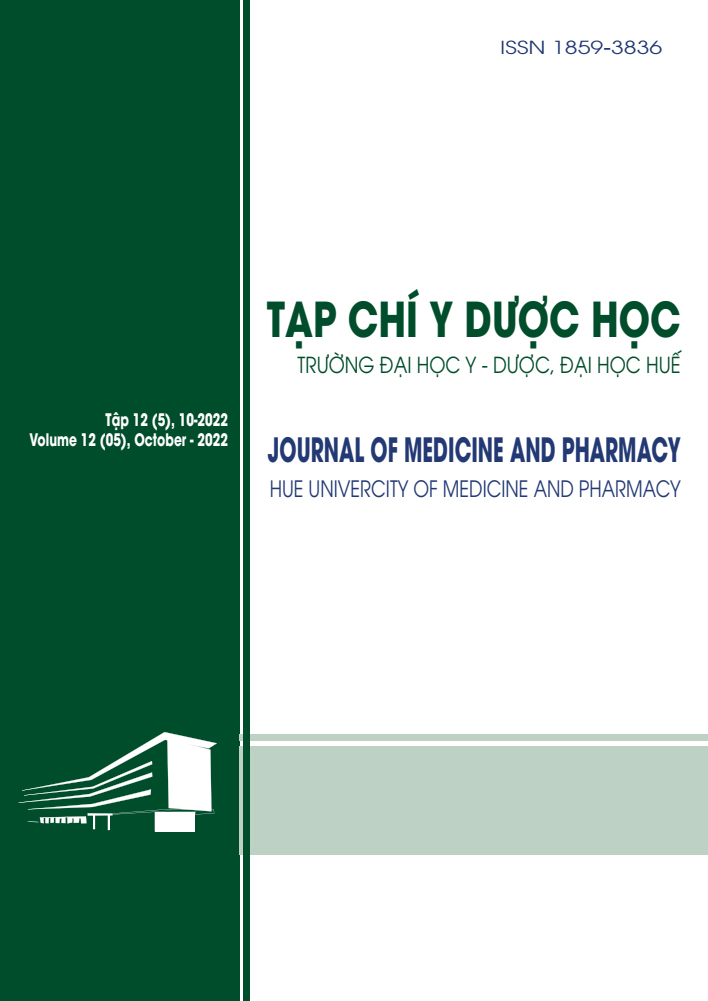Abstract
Background: Klotho is a protein with multiple biological functions in various organs, particularly the kidneys. In the proximal tubule, Klotho acts as a co-receptor for fibroblast growth factor 23 (FGF23), regulating phosphate and vitamin D metabolism. In the distal tubule, Klotho enhances calcium and sodium reabsorption. Serum Klotho originates from the kidneys, and its levels decrease with declining renal function. Studies indicate that serum Klotho levels progressively decrease with lower glomerular filtration rate (GFR) in chronic kidney disease (CKD), but differences across CKD stages remain controversial. Currently, there are no published data on serum Klotho levels in CKD patients in Vietnam.
Objectives: To determine serum Klotho levels in CKD and investigate their relationship with GFR and selected biochemical parameters.
Materials and method: A cross-sectional, case-control study was conducted with 153 CKD patients and 60 healthy controls. Serum Klotho levels were measured using enzyme-linked immunosorbent assay (ELISA). Levels of blood urea, creatinine, hemoglobin, albumin, calcium, phosphate, parathyroid hormone (PTH), and 25-hydroxy vitamin D were analyzed using an automated biochemical analyzer.
Results: The median serum Klotho level in CKD patients was 386.43 pg/ml, significantly lower than in the control group (549.28 ± 175.31 pg/ml, P<0.05). The mean serum Klotho levels in CKD stages 1, 2, 3, 4, and 5 were 497.95 ± 151.32, 490.46 ± 183.16, 388.23 ± 120.53, 333.21 ± 97.37, and 317.97 ± 127.04 pg/ml, respectively. A significant decline in serum Klotho was observed from CKD stage 3 compared to controls (P<0.001). Serum Klotho showed a moderate negative correlation with urea (r=-0.393, P<0.001), creatinine (r=-0.463, P<0.001), and serum PTH (r=-0.383, P<0.001), while a moderate positive correlation was observed with GFR (r=0.451, P<0.001) and hemoglobin (r=0.312, P<0.001). Multivariate regression analysis identified GFR as the only independent predictor of serum Klotho levels (β coefficient = 1.916, P<0.001).
Conclusions: Serum Klotho levels decrease in CKD, with a significant decline from stage 3, and are associated with GFR. Further studies are needed to evaluate the potential role of Klotho as an early biomarker for CKD.
| Published | 2025-04-24 | |
| Fulltext |
|
|
| Language |
|
|
| Issue | Vol. 15 No. 1 (2025) | |
| Section | Original Articles | |
| DOI | 10.34071/jmp.2025.1.21 | |
| Keywords | Klotho, mức lọc cầu thận, bệnh thận mạn Klotho, glomerular filtration rate, chronic kidney disease |

This work is licensed under a Creative Commons Attribution-NonCommercial-NoDerivatives 4.0 International License.
Copyright (c) 2025 Hue Journal of Medicine and Pharmacy
Kuro-o M, Matsumura Y, Aizawa H, Kawaguchi H, Suga T, Utsugi T, et al. Mutation of the mouse klotho gene leads to a syndrome resembling ageing. Nature. 1997;390(6655):45-51.
Neyra JA, Hu MC, Moe OW. Klotho in Clinical Nephrology: Diagnostic and Therapeutic Implications. Clin J Am Soc Nephrol. 2020;16(1):162-76.
Kurosu H, Ogawa Y, Miyoshi M, Yamamoto M, Nandi A, Rosenblatt KP, et al. Regulation of fibroblast growth factor-23 signaling by klotho. J Biol Chem. 2006;281(10):6120-3.
Andrukhova O, Slavic S, Smorodchenko A, Zeitz U, Shalhoub V, Lanske B, et al. FGF23 acts directly on renal proximal tubules to induce phosphaturia through activation of the ERK1/2-SGK1 signaling pathway. Bone. 2012;51(3):621-8.
Andrukhova O, Zeitz U, Goetz R, Mohammadi M, Lanske B, Erben RG. FGF23 promotes renal calcium reabsorption through the TRPV5 channel. EMBO J. 2014;33(3):229-46.
Andrukhova O, Slavic S, Zeitz U, Riesen SC, Heppelmann MS, Amann K, et al. FGF23 regulates renal sodium handling and blood pressure. EMBO Mol Med. 2014;6(6):744-59.
Akimoto T, Yoshikawa H, Watanabe Y, Numata A, Yamazaki T, Takeshima E, et al. Characteristics of urinary and serum soluble Klotho protein in patients with different degrees of chronic kidney disease. BMC Nephrol. 2012;13:155.
Seiler S, Rogacev KS, Roth HJ, Shafein P, Emrich IE, Neuhaus S, et al. Plasma Klotho is not related to kidney function and does not predict adverse outcome in patients with chronic kidney disease. Kidney Int. 2013;83(1):121-8.
Chapter 1: Definition and classification of CKD. Kidney Int Suppl. 2013;3(1):19-62.
Lu S, Robyak K, Zhu Y. The CKD-EPI 2021 Equation and Other Creatinine-Based Race-Independent eGFR Equations in Chronic Kidney Disease Diagnosis and Staging. J Appl Lab Med. 2023;8(5):952-61.
Rotondi S, Pasquali M, Tartaglione L, Muci ML, Mandanici G, Leonangeli C, et al. Soluble α-Klotho Serum Levels in Chronic Kidney Disease. Int J Endocrinol. 2015;2015:872193.
Shimamura Y, Hamada K, Inoue K, Ogata K, Ishihara M, Kagawa T, et al. Serum levels of soluble secreted α-Klotho are decreased in the early stages of chronic kidney disease, making it a probable novel biomarker for early diagnosis. Clin Exp Nephrol. 2012;16(5):722-9.
Pavik I, Jaeger P, Ebner L, Wagner CA, Petzold K, Spichtig D, et al. Secreted Klotho and FGF23 in chronic kidney disease Stage 1 to 5: a sequence suggested from a cross-sectional study. Nephrol Dial Transplant. 2013;28(2):352-9.
Liu QF, Ye JM, Yu L, Guo XZ, Zhou YL, Zhang Y, et al. Plasma s-Klotho is related to kidney function and predicts adverse renal outcomes in patients with advanced chronic kidney disease. J Investig Med. 2018;66(3):669-75.
Heijboer AC, Blankenstein MA, Hoenderop JG, de Borst MH, Vervloet MG. Laboratory aspects of circulating α-Klotho. Nephrol Dial Transplant. 2013;28(9):2283-7.
Wang Q, Su W, Shen Z, Wang R, Zhang L, Xu M, et al. Correlation between Soluble α-Klotho and Renal Function in Patients with Chronic Kidney Disease: A Review and Meta-Analysis. Biomed Res Int. 2018;2018:9481475.
Yu LX, Wang M, Huang X, Yu J, Wang Y, Sun J, et al. The controversy of klotho as a potential biomarker in chronic kidney disease. Front Pharmacol. 2022;13:931746.







